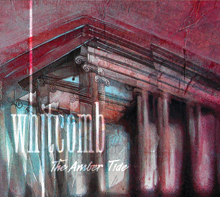
THE FORCE OF REVOLUTION Whitcomb. |
Last weekend, visitors to Record Store Day at Bull Moose's Windham location found themselves face-to-face with enough amp firepower to rattle the fillings right out of their back molars, especially given the placement between two head-high shelves of DVDs that promised to focus sound like a shotgun barrel. The five black-T-shirted lads of Whitcomb showed restraint, though, even as parents scrambled to fit their kids with earplugs."We've never played this quietly," frontman Brant Dadaleares said after the first song. "Hope it sounds okay."
In fact, it sounded wonderful. While there is a sublime beauty to the rippling waves of sound the highly coordinated band can usher through a club, hearing them at a more subdued volume emphasized just what it is that makes their heaviness so utterly listenable. They are precise, even delicate, in their constructions, guitarists Sean Libby and Andy Beavis dancing alternately in lock step with one another and in opposition. Mark Sayer's cymbal work was almost effervescent, the high hat shimmering. There was even space for Ryan Fleming's bass to be heard in individual notes, rather than just as a hint at the lower portion of the audible range.
Giving their new album, Amber Tide, a few more listens following that performance, there's yet further appreciation for the kinetic force Whitcomb generate. They combine the theatricality of early prog like Genesis with the calculating exactitude of Machine Head, delivering weighty punch in a soaring, invigorating fashion.
Dadaleares is crucial, of course. This same music with a screamer, or an Ozzy wannabe, could easily fall apart into self-mockery. Dadaleares is measured, though, staying within himself while still infusing James Whitcomb Riley's Gothic verse (all the band's lyrics are taken from his poems — Google him) with just enough lilt to keep it otherworldly.
You never know from where they'll take inspiration. "Memory" is cribbed from "A Christmas Memory," but Dadaleares chooses to focus most on the poem's last line, a desperate repetition of "I only want my Ma!" Fleming's bass is frantic out of the gate, a bouncy opposition to the feedbacking, swirling guitars, the drums brooding. Then things settle into striated, chunking guitar chords, punctuated mid-song by descending piano chords that lend yet more Gothicism. Finally, a piercing Libby solo screeches and then is folded upon itself before giving way to vocals pushed so far to the back they are but the echo of Christmases past.
Producer Jonathan Wyman has done some of his best work here, capturing the drums so that they are crisp and high in the mix and yet not overpowering or obtrusive, letting Sayer be musical instead of muscular. His toms pop especially in "Dream," where his three-note cymbal competes with Fleming's arching riff for coolest segue into a new verse. The second time the song comes to a halt, the pop of the guitar upon return is a gut punch. Listen for Sayer's backing vocals here, too.
"Kissing the Rod" is so much more staccato and crunchy, just about jaunty. Dadaleares simmers on the "We have erred/In that dark hour we have known/When our tears/Fell with the shower all alone," but the music apes, in its own metallic way, Riley's finish: "Just be glad."